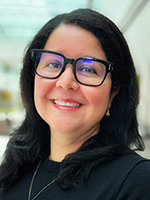
The Entomological Society of America's 2025-2026 elections, conducted via electronic ballot, closed August 13, 2025.
To see candidates, click to expand the categories below:
ESA Society Elections
ESA Vice President-Elect
ESA Treasurer
ESA Vice President-Elect
- Jeff Bradshaw, University of Nebraska–Lincoln
- Faith Oi, University of Florida
- Floyd Shockley, National Museum of Natural History, Smithsonian Institution
Jeff Bradshaw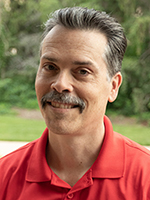
University of Nebraska–Lincoln
Bio: Dr. Jeff Bradshaw is professor of entomology and director of the Plant Health program at the University of Nebraska–Lincoln. He earned a B.S. and M.S. in zoology at Southern Illinois University where he studied the life histories and biology of Reduviidae. He earned two Ph.D. degrees in entomology and plant pathology, respectively, at Iowa State University, where he studied insect and virus pests of soybean. He has published 69 peer-reviewed journal articles on a wide range of topics from insect biology and applied ecology to host plant defense, and he has mentored 46 students. His current research focuses on wheat IPM and biocontrol. He has had roles in administration, research, extension, and formal teaching. Currently he leads the Doctor of Plant Health degree program at UNL, an interdisciplinary, student-centered program training leaders and practitioners in plant health.
Past ESA activity or other volunteer service: Bradshaw has been active in ESA for over 20 years, serving in numerous elected and appointed roles. He held presidential terms for both the North Central Branch (NCB) and the Plant-Insect Ecosystems (P-IE) Section and served as NCB secretary-treasurer and as the NCB 2025 Annual Meeting Local Arrangements chair. He has experience leading joint (NCB-Southwestern Branch) and online (P-IE) Annual Meetings. He has also served on several ESA committees: Student Affairs, Entomology Games, Common Names, Resolutions, YouTube Your Entomology Awards, Student, Transition, and Early-Career Professional, Calendar, and Access & Opportunity Committees. He served as contributing editor for American Entomologist (2019–2024). His additional service includes national grant review panels and active roles in regional and national scientific committees and organizations.
Candidate statement: I would be honored to continue serving the Society that has shaped my career. Collaborative, team-oriented leadership in science is more essential than ever. ESA has built strong platforms—Grand Challenges, Science Policy, and position statements—to inform action. If elected, I will engage our membership to assess progress on the Grand Challenge Agenda and help shape the next strategic plan beyond 2025. This could involve co-leading shared goals across borders via the 2028 joint Annual Meeting in Quebec, Canada. As global priorities shift and U.S. public investment in science faces disruption, I am committed to working strategically with all members to strengthen ESA’s impact, elevate diverse voices, support early-career scientists, and ensure our Society remains a trusted, relevant, inclusive, and future-ready leader in science from research to practice.
VP-Elect candidate statement on critical issues and future vision for the Society: Slow governance has been an issue for ESA for some time. Substantial constitutional and bylaw revisions in recent years have aided flexibility in Society governance, and there is a current proposal for a broad revision to governing structure. Should revision be adopted by the membership, involvement of member leaders will be critical to operationalize a plan that ensures shared governance, trust, and transparency in the transition and throughout deployment. The timing of this revision may be intentionally aligned with the current strategic plan, which is in its last year. Looking ahead, I recognize that this revision (and a new strategic plan?) would potentially be deployed within a societal landscape of historic disruption for many of our early-career members employed (or formerly employed) in civil service, corporate reductions in force, power struggles between universities and the U.S. executive branch, and holds on public funding opportunities. Thus, our policy efforts should be laser focused on opportunities to rebuild and be supported as such in our strategic plan. Some publications within our portfolio have challenges from real or perceived relevance, and expiration of revenue guarantees with OUP are a challenge. We should explore creative models to incentivize manuscript review and encourage OUP’s OA strategy for broader academic conference contracts. Lastly, our Annual Meeting plus publications likely recruit our largest share of revenue—member dues. However, volunteer service is critical to ESA. Fundamentally, member dues and volunteer service (or its value) must at least be in parity for a not-for-profit to remain sustainable.
Faith Oi 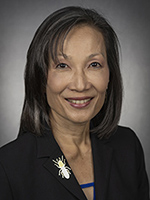
University of Florida
Bio: Dr. Faith Oi is an extension professor at the University of Florida. She is nominated by MUVE and endorsed by ESA’s Southeastern, Southwestern, and International Branches. Oi completed leadership development programs LEAD21 and LEAD IFAS. She is the director of Pest Management University (PMU), whose mission is to provide evidence-based programs on urban pest management. She leads a team of experts from industry, academia, and regulatory agencies with core values that support science and service. Awards include: Pest Control Technology-Syngenta Crown Leadership, ESA-SEB Extension Award, Florida Entomological Society (FES) Achievement in Extension, Florida Extension Service Assoc. Family & Consumer Sciences Outstanding Specialist, IPM Symposium Team Award for PMU, and FES Team Research Achievement Award. She works globally with insect science advocates.
Past ESA activity or other volunteer service: Oi has actively and continually served the ESA at the Governing Board, Section, and Branch levels since 1995. Leadership and service capacities include incumbent treasurer (2 terms), member of the Executive Committee of the Governing Board (2 terms), Finance Committee, chair (2 terms), Financial Task Force Committee (current), Rules and Ethics Committee (2 terms), Professional Advancement Career Training mentor (4 cohorts), and Diversity, Equity, and Inclusion Committee (chair). MUVE: Section president. SEB: chair for Nominations, Program, and Student Awards Committees. Others: She has served on the National Pest Management Association technical committee for over 25 years and in multiple roles for the National Conference on Urban Entomology as conference chair, Student Awards chair, and Planning Committee member.
Candidate statement: If elected, my goal is to focus on member needs, science, and service. ESA’s strength lies in its active, volunteer members, and I am committed to ESA’s mission to promote opportunities for our members to widely and passionately share insect science! How?
- I propose to broaden our support for practitioners and certification programs.
- I support member workforce and professional development, particularly in artificial intelligence.
- I will continue ESA’s commitment to science and policy, which will enhance our ability to develop solutions for grand challenges such as vector-borne disease, invasive species, and food security.
- As the current treasurer, I have a deep understanding of the economic challenges we face, and I am committed to working toward a balanced budget in consultation with the treasurer and Financial Task Force for the fiscal health of the Society.
VP-Elect candidate statement on critical issues and future vision for the Society: Our discipline and membership, regardless of Branch, Section, and membership type, face the critical issues of science denialism, shifts in policy priorities, and related funding impacts. Additionally, artificial intelligence has affected virtually every aspect of our lives, positively and negatively, including our scientific process, publications, and formal and informal teaching. Finally, ESA’s struggling financial health is a critical issue. We must diligently harmonize the operational and strategic budgets to more effectively leverage our resources. If we do nothing, the confluence of these critical issues will impede our abilities to 1) support changing member needs, including, but not limited to, workforce and professional development, and 2) develop collaborations with transdisciplinary partners that can provide solutions to grand challenges (e.g., vector-borne disease, invasive species, food security), complex conservation questions, and emerging issues. Our future vision for ESA must consider the fundamental question of “who we are.” ESA has demonstrated success in “inward-facing” communication functions such as publications and meetings. However, science communication methods have changed, and we must explore additional avenues of sharing our science to increase our relevance and impact to a broader audience. I propose adopting the concept of “future-proofing” as a general framework to address critical issues and rapid changes affecting members. While not new, “[f]uture-proofing means designing or building technology, systems, or products in a way that ensures they remain useful and effective for our members as new technologies, trends, and needs emerge” (adapted from Mendix). I have listed what I intend to accomplish in the Candidate Statement above.
Floyd Shockley 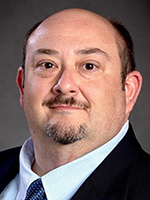
National Museum of Natural History, Smithsonian Institution
Bio: Dr. Shockley serves as the collections manager for the Department of Entomology at the Smithsonian National Museum of Natural History. He earned his B.A. in biology from Westminster College, M.S. in entomology from the University of Missouri, and Ph.D. in entomology from the University of Georgia. Throughout his career, Shockley has conducted extensive collections-based systematics research on the evolution, taxonomy, morphology, and natural history of fungus-feeding beetles. He has authored or co-authored 94 publications and given 68 presentations at professional meetings. He is heavily engaged in science communication, having co-developed seven exhibits, conducted 56 public programs, and appeared more than 276 times in media and popular press discussing entomology, natural history, collections, and museums. He is a Fellow of the Royal Entomological Society.
Past ESA activity or other volunteer service: An active member of ESA since 1997, Shockley has served the Society at the Branch, Section, and national levels. He served as SysEB Section president (2018) and program co-chair for the Annual Meeting (2024) as well as on a broad range of national ESA Committees, including Membership (2004-06), Entomology Games (2014-19), and Science Policy (as SysEB rep, 2016-17 and Eastern Branch rep, 2022-present), and was chair of the American Entomologist Advisory Board (2018-19) and a PACT mentor (2021-2023). He has served as president of the Entomological Society of Washington (2014) and the Entomological Collections Network (2015-17), and treasurer of the Coleopterists’ Society (2005-07). Shockley serves on the UGA CAES Alumni Association Board of Directors and has held many leadership positions at the Smithsonian.
Candidate statement: ESA has been essential to my success as an entomologist by offering opportunities for research sharing, networking, and for staying updated on what is happening across the many entomological subdisciplines. ESA has greatly influenced me, and I aim to ensure it provides the same value to current and future members. If elected, I would strive to give everyone a voice in shaping our Society’s future and lead through reconciliation when visions for ESA differ. We must embrace new ideas and innovation while also respecting previous generations of entomologists and their myriad contributions to our science and our Society. I look forward to the opportunity to collaborate with volunteer leaders across Sections, Branches, committees and the Governing Board, along with ESA staff, to maintain ESA as a strong, international, and interdisciplinary organization for our members.
VP-Elect candidate statement on critical issues and future vision for the Society: ESA members enhance our understanding of the natural world, its biodiversity, and how both are rapidly changing. They contribute to addressing the threat of invasive species and native pests to agriculture, promote conservation efforts for pollinators and other species under threat of extinction, and monitor vector species to safeguard human, plant and animal health. Cooperation at various levels is essential, and ESA facilitates this cooperation among academic, government, and industry leaders to solve global challenges. To accomplish this, ESA must remain financially strong so that it can continue to serve as an open place for interdisciplinary collaboration and provide year-round value to its members, beyond its Annual Meeting. I pledge to listen to member needs, act responsibly, and lead with transparency and trust through upcoming challenges. Steady, compassionate leadership that appreciates the lessons of the past, recognizes and acts strategically to set current priorities, and keeps a forward-focused approach to addressing the next set of challenges is critical to ensuring ESA remains relevant to its members and to the global scientific community. I look forward to working with all ESA members in the coming years.
ESA Treasurer
 Scott O'Neal
Scott O'Neal
FSS, Inc.
Bio: Dr. Scott O'Neal conducts stored product entomology research as director of research and development at FSS, Inc. Scott earned his Ph.D. in entomology from Virginia Tech, M.S. in forensic science from Virginia Commonwealth University, and B.S. in genetics and microbiology from Purdue University. He conducted USDA NIFA-funded insect physiology and toxicology research as a postdoc at the University of Nebraska–Lincoln and engaged in crop protection research and project leadership as a research entomologist at Corteva Agriscience. Scott has also gained business and financial management experience outside of ESA by founding and managing the 501(c)3 nonprofit Richmond Fencing Club, serving on the board of directors for 10 years with seven years as the executive director. He is nominated by the PBT Section and has been endorsed by FIT, MUVE, NCB, SEB, SWB, and the ECP Committee.
Past ESA activity or other volunteer service: Scott has been an active leader within ESA for the last 10 years and currently serves as the first Early Career Representative on the ESA Governing Board, a term that ends this year. As a member of the Governing Board, Scott also serves as liaison to the ECP Committee and as a member of the President’s Financial Task Force. Previous leadership roles include serving as chair of the ECP Committee and as ECP representative on the PBT Section Governing Council. Throughout his time with ESA, Scott has worked to increase opportunities and support for student and early career members. His efforts include introducing ESA’s first “speed networking” event, launching the ECP Recognition Symposium, developing a popular workshop series at the Annual Meeting to promote industry careers, and spearheading the Bylaws change that added the ECP Representative to the Governing Board.
Candidate statement: As an engaged member and volunteer leader in ESA for the last 10 years, it has been my privilege to serve an organization that has done so much to support my personal and professional growth. During my time on ESA’s Financial Task Force, I have gained deeper insight into the fiscal challenges that our organization faces if we are to ensure continued financial stability. My goal in running for the position of ESA Treasurer is to continue supporting all members by upholding the fiduciary responsibility of this office. If elected, my priorities would be: 1) to ensure ESA’s long-term financial health by continuing our commitment to fiscal sustainability, 2) to evaluate and refine our budget models in support of transparency and accountability, and 3) to explore opportunities for the growth and diversification of our revenue streams to support ESA’s core missions now and in the future.
Honorary Members
Honorary Members
- Michael Brewer, Texas A&M University
- Jerome Grant, University of Tennessee
- Sujaya Rao, University of Minnesota
Michael Brewer
Texas A&M University
Dr. Michael Brewer has been a member of the Entomological Society of America (ESA) since 1983. He is currently professor with Texas A&M AgriLife Research in Corpus Christi, where he is responsible for field crops entomology research, outreach, and graduate education. He is also Regents Fellow, a Texas A&M System-wide title bestowed in 2022. His academic home is the Department of Entomology in College Station. He addresses pest management issues relevant to fiber and grain crops, with emphasis on regional pest risk assessment and pest suppression support including conservation of natural enemies within large-scale agroecosystems. He has published 139 journal articles (86 in ESA journals) and 11 book chapters and has led one edited book and three Annual Review of Entomology articles.
Brewer has contributed to the publication portfolio of the ESA over a 26-year period. He has contributed as a Journal of Economic Entomology (JEE) subject editor for 18 years, as Editorial Board member of two journals, and as JEE co-editor-in-chief (co-EIC) over the last six years (appointed in 2019). Most recently he has provided support and leadership as part of a JEE team of three co-EICs, over 50 subject editors, and dedicated ESA publications staff to oversee the review process, nurture initiatives, and carry out policies of the ESA Publication Council. Journal initiatives that Brewer championed working with the JEE management team include 1) submission stage quality control (a re-vitalized initial screening of manuscripts), 2) strengthening guidance to authors (release of a best practices guide and refreshing JEE section descriptions), and 3) special collections (regularly published in JEE since 2021). Throughout his service as co-EIC, board member, and subject editor, he has promoted cross-journal coordination to support complementary thrusts and manuscript transfers and heighten editor representation across career stage, gender, and international categories. Brewer’s service alongside the JEE and ESA publication team has resulted in ESA maintaining its status as a primary source of literature in insect pest management worldwide, with JEE as a Q1 journal, its impact factor in the 2.0-2.5 range, and record submission numbers approaching 1,000 annually. These successes have occurred in an expanding landscape of entomology journals.
Beyond his publication service and leadership, Brewer is a long active supporter of annual ESA Branch and Annual Meetings, contributing as symposium organizer, speaker, moderator, sponsor of his graduate student activities, and member of the Awards Committee and Editorial Board. He has provided leadership to other organizations, including as president of the University of Wyoming chapter of Sigma Xi and president-elect of the Society of Southwestern Entomologists. He has served as chair of array of research, extension, and academic committees, including several USDA NIFA multi-state and IPM committees.
He has received several ESA awards in integrated pest management (IPM) in recognition of his individual (2019 SW Branch Excellence in IPM) and team (2018 P-IE Section IPM Team Award) achievements. He also received recognition in university service (TAMU: Superior Service; elected member of Research PI and Promotion Committees, Regent Fellow; U. Wyoming: Early Career) and federal service (EPA Team Outstanding Achievement, USDA Regional Team Projects of Excellence).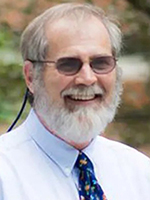 Jerome Grant
Jerome Grant
University of Tennessee
Jerome Grant received his B.A. in biology (1977) from Berea College in Kentucky, M.S. in entomology (1980) from the University of Kentucky, and Ph.D. in entomology (1983) from Clemson University. After graduation, he joined the Department of Entomology at Clemson University as a visiting assistant professor for two years before joining the faculty in the Department of Entomology and Plant Pathology at the University of Tennessee (UT) in 1985. Since arriving at UT, he has served as leader of the Integrated Pest Management (IPM)/Biological Control Research Laboratory for 39 years and has been the state survey coordinator for four years.
His research on invasive insects and weeds and their biological/ecological interactions with other species has provided critical information to improve management programs against invasive species in numerous systems, such as the Great Smoky Mountains National Park. He has directed 54 graduate students, mentored more than 100 undergraduate students, developed over 200 publications, and averaged about $300,000 in grant funding annually. With a 25% teaching and 75% research appointment, Jerome teaches/co-teaches seven undergraduate and graduate courses, emphasizing general entomology and IPM in a two-year cycle, and he has taught 14 different courses during his career. He actively engages in community outreach activities, encouraging participation by undergraduate and graduate students. He has developed annual educational outreach events to showcase entomology, including the Buggy Buffet, Cricket Spittin’ Contest, Butterfly House (Butterfly Festival), Bug Camp, Insect Zoo, Bugs on Campus Photo Contest, Insects in Our Lives Traveling Exhibit, and others that reach more than 5,000 people annually. He has received numerous research and teaching awards, including ESA’s Distinguished Achievement Award in Teaching in 2004 and UT’s Excellence in Teaching Award in 2025.
Jerome has been an active ESA and Southeastern Branch (SEB) member for 45 years. Two early accomplishments were serving as a member of Clemson University’s championship team in SEB’s first Entomology Games and receiving SEB’s John Henry Comstock Award (both 1983). He served on his first Branch committee in 1985 and first served at the national level in 1989, when he chaired an awards committee representing ESA at the International Science and Engineering Fair in Knoxville, Tennessee. He became hooked on serving ESA and has been active ever since. He served as co-program chair for one ESA Annual Meeting, program chair for one SEB Branch Meeting, co-chair of the Local Arrangements Committee for one Annual Meeting (1996), and chair of the Local Arrangements Committee for three Branch Meetings. While serving as co-chair of ESA’s Student Competition Committee, he guided the first wide-scale trial using digital scoring of presentations by judges, which was implemented the following year. As chair of the Committee on Awards and Honors, he worked with the ESA president and staff to streamline awards presentations while still respectfully honoring recipients. As co-chair of the Program Committee (2011-2012), he spearheaded efforts to offer activities and tours for attendees to enhance their experience (Body Farm Tours, football game tickets, themed t-shirt). He served as SEB’s Member-at-Large, where he interacted at the national level on behalf of Branch membership. He has authored or co-authored more than 300 presentations at ESA and SEB Meetings. Fifty three of his graduate students have joined ESA as student members, presenting at least one paper at ESA Annual or Branch Meetings. His students have received about 40 student paper awards at ESA Annual or Branch Meetings (including approximately eight President’s Prize awards); one student received SEB’s John Henry Comstock Award.
Jerome served as gamesmaster and moderator for SEB’s Entomology Games for 11 years, improving the game experience for participants and attendees to enhance interest and participation. He encouraged diversity and inclusion by inviting non-traditional colleges and universities to participate. He led the Branch’s first effort at a virtual competition during COVID-19 to ensure students had the opportunity to compete. He served as chair of SEB’s Entomology Games Committee and member of ESA’s Entomology Games Committee.
Jerome has been active in the Tennessee Entomological Society, serving as president and chair of almost every committee during his career. He served as associate editor of the Journal of Agricultural Entomology and Kasetsart University’s Journal of Natural Science, as well as two terms on UT’s Faculty Senate and as president of Southeastern Biological Control Working Group.
Throughout his career, Jerome has encouraged students to join and become involved in ESA. As a first-generation college student from an underrepresented background, he understands students' difficulties when undertaking new adventures. He enjoys sharing his experiences so that students can gain perspectives and make better decisions as students, members of professional societies, employees, and beyond. Like Flik in “A Bug’s Life,” he encourages students to Dream Big!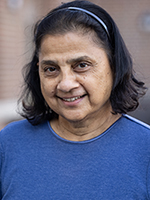 Sujaya Rao
Sujaya Rao
University of Minnesota
A native of India, Dr. Sujaya Rao received B.S. (Honors) and M.S. degrees in zoology from the University of Delhi, a Ph.D. degree in entomology from the University of Minnesota (UMN), and postdoctoral training at the University of Delaware (UD) and the University of California (UC), Berkeley. She was hired as an extension advisor for UC Cooperative Extension and later joined the faculty at Oregon State University (OSU). She served as the undergraduate research director at OSU for two years before returning to her Ph.D. alma mater as the department head.
Sujaya’s research interests span pests and pollinators. At UMN and UD she studied semiochemically mediated interactions in corn impacting pests and parasitoids, while at UC Berkeley she assessed biological control of strawberry pests. As a field crop entomologist in Oregon, Sujaya studied diverse pests including the European crane fly (molecular marker developed for larval identification), seed thrips (host range), cereal leaf beetle (CLB) (pheromone trapping), and clover root borer (entomopathogen impacts). A serendipitous observation in the CLB study led to her discovering a new bee monitoring tool, the blue vane trap. Thereafter, her research expanded to native bees. Noteworthy accomplishments with collaborators include new insights gained on bee vision from a study on sunlight-induced fluorescence from the blue vanes and studies with a microsatellite marker, a wireless mini sensor, and number tags that documented remarkable (over 15 kilometer) long-range bumble bee flight behavior.
Sujaya’s efforts in enhancing the profile of entomology through education are also remarkable. Besides teaching integrated pest management (IPM) at OSU and UMN and as a Fulbright Scholar in Ecuador, she taught courses like “Got Bees? Declines and Conservation of Honey bees and Native bees” and “Insect Warriors” to draw students to entomology. Her $1.3 million NSF GK12 Program provided graduate students with a unique opportunity of delivering inquiry-based lessons in K-12 schools (student comment: “the best growing and learning experience” at OSU) while NSF REU participants gained pollination research experience across native and agricultural landscapes. In her innovative “Partners in Nature” program, Sujaya provided K-12 students with an entomologist’s experience to inspire them to pursue entomology careers. They conducted pollination research and presented their results at a ‘conference’. Student comments: “It changed how I viewed scientists”; “I wish to work as a bee scientist.” As department head, Sujaya spearheaded the transformation of undergraduate entomology education at UMN, which led to a dramatic six-fold increase in enrollment (over 60 students) in the insect science minor. Her OSU K-12 outreach programs include “Family Bug Nights,” “Discovery Days,” and “Discovering the Scientist Within” (for inspiring students to pursue science careers). At UMN, Sujaya co-organized the new “Great Minnsect Show” for enhancing public awareness about insects.
As an ESA member for 39 years, Sujaya has participated nationally, in three branches (Eastern, North Central, Pacific) and two sections (FIT, P-IE). She has had the rare privilege to serve as president of a Branch (Pacific) and Section (P-IE) and as a Governing Board member. Currently, she serves on the Leadership Development Committee. Sujaya has been a role model, especially for BIPOC members.
Sujaya was so enthralled with her first ESA meeting as a graduate student that she attended almost every meeting since then and availed of amazing ESA opportunities. As a student, she participated in student competitions and the Entomology Games and served on the Student Affairs Committee. As a postdoc she organized research symposia, served on the Eastern Branch Awards Committee, and organized maggot races for the Insect Expo. As a faculty member she organized symposia related to research, teaching, and topics related to student training for keeping pace with emerging careers. She was invited to make leadership presentations at symposia organized by students, early career professionals, and Indian and Hispanic associations. Additional remarkable contributions include her introducing, as Pacific Branch president, a student texting competition, new awards for each Section to ensure that every member was eligible for a Branch award, and new symposia on topics such as social media in teaching. As P-IE president, for the networking section’s symposium “Effective communication: How to avoid pie in your face,” she invited a novel presenter—a local newspaper reporter. Sujaya’s ESA activities include reaching out to members to take on leadership roles and nominating regular and student members for diverse ESA awards.
Sujaya’s accomplishments have earned her the John Henry Comstock Award, Henry-Sylvia Richardson Research Grant, Distinguished Award for Teaching, and ESA Fellow honors.
Sujaya will retire this summer but plans to continue engagement in ESA activities, particularly in helping students prepare for the diversity of careers in today’s world.
Early-Career Professional Elections
Early-Career Representative to the Governing Board
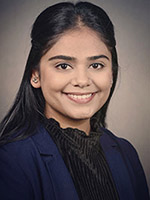 Jasleen Kaur
Jasleen Kaur
University of Florida
Bio: Dr. Jasleen Kaur is a postdoctoral researcher in entomology at the University of Florida. She has published eight peer-reviewed papers (more in progress) and reviewed 12 manuscripts for top journals, providing strong insight into the publishing landscape. Her research spans plant–insect interactions, IPM, and chemical ecology. Since 2020, she has held nine leadership roles across four organizations and served on five university committees, earning college-level recognition for her service as student senator and Graduate Student Council treasurer. As the Southeastern Branch Rep to the Early Career Professionals Committee, Jasleen champions visibility, inclusion, engagement, and professional growth of ECPs within ESA. Her global perspective and commitment to inclusive excellence shape her work and leadership in entomology.
Past ESA activity or other volunteer service: Kaur advances ESA’s mission through service as Southeastern Branch Rep on the Early Career Professionals Committee and ad hoc member of the Education & Outreach Committee, where she refined K-12 learning resources. She has organized three ESA symposia, judged four student competitions, and participated as a debater, four times as an invited speaker, and as a panelist at Annual Meetings as a Ph.D. student. She was competitively selected for the PACT Initiative (2022) and Bayer’s B4U mentoring program (2023). As treasurer/grants chair, she managed $200,000 for two years in student travel awards. She co-led a workshop impacting more than 9,000 students and conducted outreach at 16 events. She is also slated for an interview with Entomology Today.
Candidate statement: My experience as an early career scientist fuels my commitment to ensure ESA serves and uplifts others like me. Early career professionals deserve more than a seat at the table, and we must shape the agenda and future of our Society. I will lead efforts to promote transparent decision-making, strengthen collaboration across ESA Branches, and create leadership pathways reflecting the full diversity of our membership. I have a global perspective and deep commitment to service, and I will work tirelessly to make ESA more accessible, responsive, and future-ready for all ECPs. I will listen deeply, represent boldly, and act decisively.
Medical, Urban, & Veterinary Entomology (MUVE) Section Elections
MUVE Section Vice President-Elect
MUVE Section Secretary
MUVE Section Representative to the Governing Board
MUVE Section Vice President-Elect
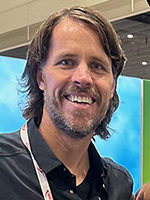 Gabriel Hamer
Gabriel Hamer
Texas A&M University
Bio: Gabriel Hamer, Ph.D., is a professor in the Texas A&M University Department of Entomology. His research and teaching broadly investigates the ecology and control of infectious diseases of humans, wild animals, and domestic animals, with particular attention to those transmitted by arthropod vectors (e.g. mosquitoes, ticks, kissing bugs). He has studied vector-host interactions that lead to parasite amplification and increased disease risk. He also develops and evaluates vector control approaches aimed at reducing human and animal disease. He has active international collaborations in Mexico, Guatemala, Argentina, and Uganda. He is a Certified Wildlife Biologist, has over 150 peer-reviewed publications, is a subject editor for the Journal of Medical Entomology, and is past chair of the American Committee of Medical Entomology.
Past ESA activity or other volunteer service: Gabriel Hamer and members of his research lab at Texas A&M University have been regular attendees of the ESA Annual Meeting and regional Branch Meetings for 15 years. He has been a past moderator of an ESA symposium. He has been a subject editor for the Journal of Medical Entomology (JME) since 2018 and organized a JME special collection published in 2024. Hamer has extensive service with other societies as well, such as the American Society of Tropical Medicine and Hygiene (ASTMH) and the Society of Vector Ecology. Hamer was a chair of the American Committee of Medical Entomology (ACME), a subgroup with ASTMH. He previously served on the ASTMH Digital Education Committee, is currently on the ASTMH Scientific Program Committee, and is currently a member of the inaugural ASTMH Mid-Career Leadership Program.
Candidate statement: The world is facing accelerating threats from insects on humans, domestic and wild animals, and our urban environment. This pattern has merged with regulatory changes creating uncertainty and additional challenges. My goal is to join MUVE leadership at this critical time to strengthen MUVE and encourage our next generation of entomologists in our Section’s fields to continue to develop professionally and fill vital positions for society. I can help maintain important MUVE initiatives such as communication by newsletters and trainee professional development given my relevant experience with these activities in other societies. Finally, ESA needs to maintain advocacy and partnering with other societies will allow a stronger voice. My affiliations with other professional societies can help facilitate these partnerships.
MUVE Section Secretary
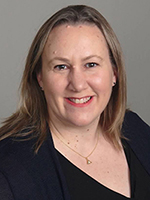 Anna Iversen, BCE
Anna Iversen, BCE
Pelsis
Bio: Anna is a Board Certified Entomologist with 23 years of experience in the pest management industry with a passion for food safety, stored product pests, and training. She earned her B.S. in biology from the University of Oregon in 2001 and her M.S. in grain science with a focus in entomology from Kansas State University in 2006. Afterward, she joined ISCA Technologies as an entomologist, where she worked on pheromone dispersal. In 2011, she joined McCloud Services and focused on technician training, standard operating procedures, and quality assurance initiatives. This continued when Terminix acquired McCloud in 2019. In 2021, Anna was hired as technical director for B&G Equipment and in 2022 was promoted to U.S. technical director for Pelsis.
Past ESA activity or other volunteer service: Anna is the current secretary of MUVE, in the last of her three-year term. Anna has been a member of ESA since 2004, attending many of the Annual Meetings. As a student, she competed (and won) in poster and oral presentations and co-organized a symposium. With ISCA, she exhibited at ESA’s Annual Meetings from 2006 to 2009. As a BCE, she has encouraged many to get their ACE, proctored exams, and led study sessions. She helped develop questions for ESA’s Public Health Entomology certificate. Anna is active with the National Pest Management Association, the Illinois chapter of the Professional Women in Pest Management, Women in Pest Control, and Pi Chi Omega.
Candidate statement: I have served as MUVE secretary for the last three years and have really enjoyed the opportunity. I've gotten to see the inner workings of the MUVE Section and better understand how ESA is positioned to bring change to its members and the industry as a whole. The people I've worked with as secretary are so passionate and engaged about entomology and its progression that I've found it to be inspiring for my own career. So, I am glad to throw my hat in for another three years.
MUVE Section Representative to the Governing Board
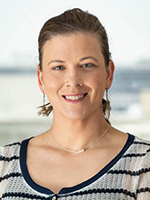 Erika Machtinger
Erika Machtinger
Pennsylvania State University
Bio: Dr. Erika Machtinger is an associate professor of entomology at Penn State University and principal investigator of the Veterinary Entomology Laboratory. She earned her Ph.D. in entomology from the University of Florida. Her research bridges medical, urban, and veterinary entomology through an integrated health approach, focusing on ectoparasites, vector ecology, and host-parasite interactions. A recipient of multiple MUVE and ESA awards, she currently directs the $6.25 million CDC-funded VectorED Network and has authored over 75 peer-reviewed and extension publications, as well as a book on equine pests. Erika prioritizes practical problem-solving, mentoring undergraduate and graduate students, empowering communities through science-based education and extension engagement and service to ESA and the field.
Past ESA activity or other volunteer service: Machtinger has served ESA in multiple roles, starting as Southeastern Branch Student Affairs Committee representative before serving on the Student Transition and Early Professionals Committee and later as MUVE representative to the Early Career Professionals Committee. Erika is the current MUVE representative to the Governing Board. She served on ESA's Publications Task Force and co-leads the MUVE Wildly Important Goal "MUVE-ing together: Connecting Entomology, Ecology, and Human Health.” Her editorial service includes roles with J. Medical Entomology, J. Economic Entomology, and J. Insect Science. She has co-organized multiple ESA symposia. Beyond ESA, she has chaired the S1076 Multistate Group and contributes to the CDCs vector-borne disease working group, the NEON Tick Technical Working Group, and The Wildlife Society's Wildlife Disease Working Group.
Candidate statement: I am passionate about continuing my service as MUVE's Governing Board representative during this pivotal time for ESA. My background in extension has taught me to effectively communicate complex science to diverse audiences—a crucial skill as we engage with policymakers amid administrative changes. I bring a proven track record of fostering collaborations across disciplines, particularly in integrated health. As a board member, I balance my fiduciary responsibility to ESA with advocacy for our science, ensuring members' concerns are represented while advancing our strategic priorities. I aim to strengthen ESA's voice in policy conversations, expand cross-disciplinary initiatives, and develop early-career professionals and students who will lead our society into the future.
Physiology, Biochemistry, & Toxicology (PBT) Section Elections
PBT Section Vice President-Elect
ECP Representative to the PBT Section Governing Council
PBT Section Vice President-Elect
- Ana Cabrera, Bayer CropScience
- Kris Silver, Kansas State University
Bio: Ana’s path to entomology began at Zamorano University in Honduras where she earned a B.Sc. in agriculture, and where she developed a passion for pest management and entomology. This led her to pursue higher education, earning an M.Sc. at the University of Illinois at Urbana-Champaign and a Ph.D. at North Carolina State University. As a postdoc researcher at the USDA and University of Florida, Ana focused on pollinator-related topics. Since joining Bayer CropScience as a pollinator safety expert, Ana supports global product registrations, co-leads a research laboratory, and has published over 10 peer-reviewed articles. Ana fosters cross-institutional collaborations and actively participates in national and international interest groups, significantly advancing the science of pollinator risk assessment.
Past ESA activity or other volunteer service: Currently, Ana co-leads the PBT Section Education and Outreach Committee, enhancing the Section's visibility through social media and achieving a 200% growth in one platform. She has co-organized the Latin/Hispanic Symposium at the ESA Annual Meeting for the last five years and contributed significantly to the creation of the SomosEnto community, which elevates Latin/Hispanic entomologists and their contributions to science. In the last few years, Ana has actively mentored seven graduate students through ESA’s EntoMentos program, the Foundation for Food & Agriculture Research, and the Bayer University Mentoring Program. Additionally, Ana serves as the current Technical Committee chair of the Pollinator Research Task Force and co-leads a working group of the International Commission for Plant-Pollinator Relationships.
Candidate statement: Dear PBT Community, I am humbly asking you for your vote and support. I’ve been co-leading the PBT Outreach and Education committee for the past year, and every time I learn from PBT members, I’m in awe of your scientific pursuits and accomplishments. If I get the honor to be the PBT VP-elect, I pledge to listen, learn from those before me, prioritize our Section’s interests and growth, and keep building a vibrant community. I bring a combination of professional experience, leadership skills, and deep commitment to service, but above all I bring my genuine desire to support and uplift the PBT community. I believe our future is bright because of you, this Sections’ talented scientists and leaders. I envision PBT as the strongest pillar of our Society, fostering collaboration, and driving discoveries that will improve our health, increase our food, and protect our environment.
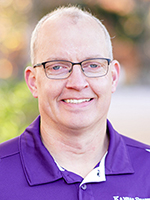 Kris Silver
Kris Silver
Kansas State University
Bio: Dr. Silver is an associate professor and director of the Integrated Molecular Entomology Core (IMEC) in the Department of Entomology at Kansas State University. He received his Ph.D. from Cornell University and completed post-doctoral positions at Michigan State and K-State. He has been part of entomology at K-State since 2016 and was promoted to associate professor and appointed director of IMEC in 2022. His research interests are in molecular entomology and toxicology, RNA interference, and the effects of pathogen infection on vector physiology. He has authored 49 publications and three book chapters. In addition to his academic duties, Silver has also served as the treasurer of the Physiology, Biochemistry, and Toxicology section of the Entomological Society of America for five years.
Past ESA activity or other volunteer service: Silver has served as moderator and judge at the ESA Annual Meetings and has served as treasurer for PBT for the last five years.
Candidate statement: As treasurer of PBT for the past five years, I have played an active role in shaping the path that PBT is following to improve our Section, increase our membership, and better serve the needs of our members. I have enjoyed this role and the opportunities it has provided, and now I wish to further serve our Section in a new leadership role. As Vice President-Elect, it will be my responsibility to support and execute the initiatives of the sitting president as well as to learn the duties of that office. I look forward to the challenges that this new role will entail.
ECP Representative to the PBT Section Governing Council
 Zinan Wang
Zinan Wang
Department of Entomology, University of Kentucky
Bio: Dr. Zinan Wang is currently an assistant professor in the Department of Entomology at the University of Kentucky. His program integrates molecular biology, genetics, analytical chemistry, and bioinformatics to investigate the molecular basis of physiological adaptation. Wang received his bachelor’s degree from Beijing Forestry University in 2013. He moved to the U.S. for his graduate studies in entomology in 2015. He first obtained his master’s degree in entomology at Louisiana State University in 2017. He then pursued his Ph.D. in a dual major program focusing on entomology and ecology, evolutionary biology, and behavior (EEBB) at Michigan State University, which he completed in 2021. His work has resulted in 18 publications across various peer-reviewed journals, including first-authored papers in high-impact journals such as Science Advances and eLife.
Past ESA activity or other volunteer service: Wang has been an active member of the Entomological Society of America since 2015. He has participated in student debates, presented research, organized member symposia, and volunteered as a session moderator at ESA Annual Meetings. From 2018 to 2020, he served as the North Central Branch Student Representative, helping to represent and support student members. He currently serves as Vice President of the ESA Overseas Chinese Entomologists Association, where he works to promote international collaboration and engagement within the entomological community.
Candidate statement: I’m excited to serve as the Early Career Professional Representative for the PBT Section at ESA, aiming to strengthen a more inclusive and supportive community. Being an early career scientist myself, I recognize the difficulties of this phase and want to elevate ECP voices in our planning. If elected, I plan to establish chances for networking, mentorship, and heightened visibility through ECP-organized workshops, sharing resources, and hosting career development activities. I prioritize collaboration, transparency, and equity, and I am committed to cultivating environments where all early career members feel empowered to develop, lead, and influence the future of entomology.
Plant-Insect Ecosystems (P-IE) Section Elections
P-IE Section Vice President- Elect
P-IE Section Secretary
P-IE Representative to the Publications Council
P-IE Section Vice President-Elect
- Michelle Boone, Colorado State University/National Park Service
- Xavier Martini, University of Florida
- Shannon Murphy, University of Denver
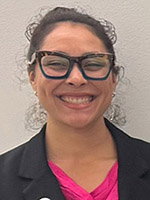 Michelle Boone
Michelle Boone
Colorado State University/National Park Service
Bio: Michelle is a federal contractor working with the National Park Service Inventory and Monitoring Division, where she oversees pollinator inventory projects at over 25 park units. She earned her A.A. in liberal arts at North Hennepin Community College, B.Sc. in biology at the University of St. Thomas, and Ph.D. in entomology at the University of Minnesota (UMN). Michelle is a dedicated servant leader, having served previously as chair of the Graduate Student Board and associate director of programming on the Council of Graduate Students at UMN, president of the Honors Society at North Hennepin Community College, and an elected member of her local district council in Saint Paul, Minnesota. Michelle is a current ESA Science Policy Fellow.
Past ESA activity or other volunteer service: Michelle has been a member of ESA and the P-IE Section since 2017. She has previously served as the student representative on the P-IE Governing Council and vice chair on the Leadership Development Committee. She currently serves on the NCB ECP committee. Michelle is committed to supporting the next generation of leaders in entomology and has organized ESA workshops at the national and Branch levels on applying to ESA awards, the experiences of women of color in entomology, developing professional networks, and mentorship. Michelle has been an active mentor in the ESA EntoMentos program since its inception. She is passionate about public outreach and volunteers with the Xerces Society for Invertebrate Conservation as an outreach ambassador.
Candidate statement: I am interested in serving as P-IE Section Vice President-Elect to foster support for student and early career professional members during these extremely uncertain times and to expand science policy literacy within ESA membership. One of my primary goals if elected would be to increase resources available to members who have been affected by government cuts, such as organizing workshops for resume building and career transitioning for those who have been impacted. I would also like to share the training I am receiving through the Science Policy Fellowship program broadly to empower other members to advocate for STEM funding and the STEM workforce. I would be honored to serve and support members of the P-IE Section for the next four years.
Xavier Martini
University of Florida
Bio: Dr. Martini began as assistant professor in the Entomology and Nematology Department at UF with 70% research and 30% extension appointment. His research focuses on IPM of various pathosystems affecting Florida specialty crops, vegetables, and ornamentals. This includes Asian citrus psyllid and huanglongbing, whitefly Bemisia tabaci and tomato yellow leaf curl virus (TYLCV), as well as ambrosia beetles and laurel wilt. During his career, Martini has authored 90 publications and three patents and mentored 11 graduate students. Martini also leads an extension program on pests in cold hardy citrus. This extension effort led to the creation of an annual field day, “Citrus Health Forum,” that gathers citrus growers from northern Florida, Georgia, and Alabama.
Past ESA activity or other volunteer service: Martini has been a member of ESA since his arrival in the U.S. as a postdoc in 2010. He has organized three symposiums and served as judge for student competitions for more than 15 ESA meetings (Annual and Branch Meetings included). Martini has published 17 articles in ESA journals and reviewed 14 manuscripts for ESA. He will be the guest editor for a special collection titled “Use of Chemical Ecology in Integrated Pest Management” in the Journal of Insect Science. He is the current vice president of the Florida Entomological Society and led the organization of the 2024 Florida Entomological Society Meeting in Quincy, Florida.
Candidate statement: As the vice president of the P-IE section, I will leverage my expertise in integrated pest management (IPM), insect behavior, and ecology, along with my organizational skills, to effectively serve the Society. My objective is to enhance the Section's visibility on social media and assist fellow scientists in coordinating symposiums within our section. I aim to collaborate closely with other members of the P-IE Governing Council to organize annual initiatives focused on invasive species and to enrich our Section's newsletter with updates on current research activities within the P-IE community.
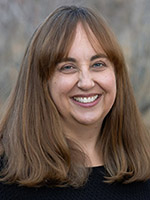 Shannon Murphy
Shannon Murphy
University of Denver
Bio: Shannon Murphy received her undergraduate degree from the University of Colorado at Boulder and her Ph.D. from Cornell University and completed two postdocs (University of Maryland and George Washington University). She joined the University of Denver in 2010 as an assistant professor and was promoted to professor in 2021. Shannon studies plant-insect interactions, focusing on evolutionary ecology and how anthropogenic global change alters insect interactions. She has mentored more than 90 undergraduates and has had 13 graduate students. She has published more than 75 papers and secured over $2 million in research funding for her lab. In 2020, ESA awarded her the Distinguished Achievement Award in Teaching. She was elected as Fellow of the Royal Entomological Society (F.R.E.S.) for her significant contributions to entomological sciences in 2025.
Past ESA activity or other volunteer service: Shannon Murphy has been a member of ESA and P-IE for 20 years. She served the Society as a subject editor for the journal Environmental Entomology for six years (2018-24) and volunteered as a judge for student awards. Other service work includes being an at-large member of the Executive Council of the Lepidopterists’ Society for three years (2016-19), and she created its student research award and has been chair of that funding program since 2018. She also serves the Royal Entomological Society, where she was previously an associate editor (2014-23), reviews editor (2023-24), and is currently an editor-in-chief for Ecological Entomology. Shannon is co-director of DU SciTech, a STEM camp for underrepresented middle-school girls. She conducts outreach in Denver Public Schools K-5 teaching students about insects and science.
Candidate statement: The Entomological Society of America has been an important part of my life for 20 years, and I would be happy to volunteer for a leadership position for the P-IE section. I have benefited greatly over the years from my interactions with other entomologists at ESA meetings. These meetings proved formative in the development of my career, and I am at a stage now where I would enjoy having the opportunity to “pay it forward” and ensure that the Society continues to be able to benefit others. I care deeply about increasing and maintaining representation in the entomological community. In my role as vice president-elect, I would strive to help early career scientists and continue my ongoing work to advocate for insects and increase public appreciation of them.
P-IE Section Secretary
- Nicole Benda, Florida Department of Agriculture and Consumer Services
- Sajjan Grover, Bayer Crop Science
- Kumar Shrestha, University of Nebraska–Lincoln
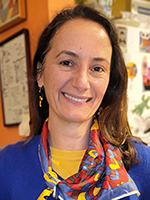 Nicole Benda
Nicole Benda
Florida Department of Agriculture and Consumer Services
Bio: Originally from south Florida, Nicole earned a Ph.D. in entomology from NCSU. She has worked on a wide range of entomology and nematology topics, including evolution, chemical ecology, behavior, biocontrol, and IPM in agriculture, honeybees, and turf and ornamentals. After a long stint working part-time, Nicole has worked in biological control at FDACS-DPI since 2021, first leading the program on cactus moth and more recently on Brazilian peppertree. She submitted a petition to USDA-APHIS to release a potential biocontrol agent of the cactus moth. In both cactus moth and Brazilian peppertree, she focuses on rearing optimization and dispersal of biocontrol agents. Nicole has worked to promote scientific understanding in a number of ways, including teaching biology to non-majors, judging middle school science fair projects, and tabling at festivals and science fairs.
Past ESA activity or other volunteer service: Nicole has been a member of ESA since 2001. She served as the ESA Southeastern Branch (SEB) program committee chair for the 2023 and 2024 meetings. She served as the ESA-SEB Nominations Committee chair for 2025. She serves as the secretary of the Florida Entomology Society (FES). She has served as a judge of student competitions, organized symposia, and presented research at the annual meetings of FES and ESA-SEB. In addition, she has been an active participant and leader in groups outside of science such as her employee activities committee, PTSA, and band boosters.
Candidate statement: I would love the opportunity to serve as secretary of the P-IE Section of ESA. My past volunteer service demonstrates my commitment to, and interest in, the power of a collaborative effort. In addition, these experiences have given me great perspective on the skills needed to successfully coordinate events and run an organization. In these roles, I work hard to provide timely and organized communication. I would use this opportunity to help increase collaborations with other Sections, increase membership engagement in and out of meetings, and support the important work of ESA to advocate for science and scientists.
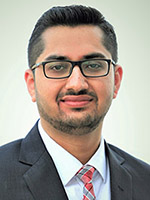 Sajjan Grover
Sajjan Grover
Bayer Crop Science
Bio: Sajjan Grover, Ph.D., is a senior scientist specializing in hemipteran discovery at Bayer Crop Science. He joined Bayer in 2022 after earning his Ph.D. in entomology from the University of Nebraska–Lincoln (UNL) in 2021, where he conducted research on molecular plant-insect interactions. His professional goal is to advance the development of innovative and sustainable strategies for agricultural pest management. Sajjan has been actively engaged with ESA since 2017. He currently serves as the North Central Branch (NCB) representative to the ESA Diversity, Equity & Inclusion Committee and as member-at-large on the ESA Leadership Development Committee. Sajjan is dedicated to mentoring students and early career professionals through initiatives that foster their professional advancement.
Past ESA activity or other volunteer service: Sajjan has organized and contributed to numerous symposia, workshops, and speed networking sessions focused on industry careers at both the North Central Branch (NCB) and ESA Annual Meetings. He has also served as a judge for student competitions and debates and as a session moderator at these meetings. Demonstrating strong leadership, he has previously held various roles, including PBT representative to the Science Policy Committee, member of the ESA Early Career Awards Committee, NCB Professional and Honorary Awards Committee, and Student Affairs Committee. He also served as president of the UNL Graduate Student Association and contributed to several other committees. Sajjan has served as a mentor in the ESA PACT program, supporting the professional development of students/ECPs. His contributions have been recognized with several prestigious ESA awards.
Candidate statement: I have been a proud member of the P-IE Section for the past eight years, during which I’ve been inspired by the dedication of many outstanding scientists who have shaped the section through visionary leadership and opportunities for member engagement. The P-IE Section has played a pivotal role in increasing my professional visibility and guiding my career trajectory. While I’ve had the privilege of serving on several ESA committees, joining the P-IE Governing Council as secretary will allow me to more directly understand and address the needs of our Section. I am passionate about giving back to the scientific community through dedicated service while growing into future leadership roles. I am committed to fostering transparent communication, elevating diverse voices, and strengthening collaborations across ESA. It would be an honor to continue serving ESA and the P-IE Section.
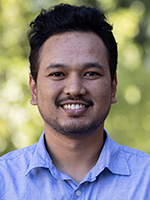 Kumar Shrestha
Kumar Shrestha
University of Nebraska–Lincoln
Bio: Kumar Shrestha holds a Ph.D. in plant science and is currently working as a postdoc, and he will soon be joining a research scientist role. With over eight years of experience in crop protection, his work focuses on identifying plant genes and biologicals to enhance pest resistance. His research explores how natural variations in plants (genes/metabolites) contribute to defense against crop pests. To address these questions, he employs multi-omics approaches and advanced molecular techniques. Kumar has published 10 peer-reviewed articles, delivered more than 17 presentations and received multiple awards for his work, including recognition for outstanding presentations. Recently, he was honored with the Outstanding Postdoc Award from the University of Nebraska–Lincoln. He was also awarded the Graduate Research Excellence Award for his Ph.D. research.
Past ESA activity or other volunteer service: At the 2024 ESA Annual Meeting, he served as a moderator for two student competitions, and he enjoyed the sessions, networking opportunities, and career development workshops. At the North Central Branch Meeting 2025, he was actively engaged, where he co-organized a session on “Exploring Novel Avenues in Plant-Pest Interaction,” where 10 professionals from early career, industry, academia and USDA presented. This session was well received by the audience. Beyond ESA, Kumar has participated in over 10 insect outreach events, educating the public, children, and teachers about entomology. Kumar also serves as the Early Career Representative on the ASPB Midwest committee, where he contributes to organizing events for young scientists. He was in the organizing committee at the ASPB Midwest meeting (March 2025), where he contributed to planning and running different sessions.
Candidate statement: I am excited to apply for the secretary position for the P-IE Section. As an active member, I’ve had the privilege of organizing the session, connecting with professionals and mentoring young folks. As an early-career researcher deeply passionate about plant-pest interactions, I am excited about the possibility of working collaboratively with fellow committee members to achieve our shared objectives. I will continue the yearly programs and events of the P-IE Section and follow and assist the president. I will try to make the Section more engaging by pushing forward a short workshop that focuses on cutting-edge technologies—for example, NGS data analysis and phenomics. This will equip young researchers with highly sought-after skills for future employment. I am eager to contribute my skills, knowledge, and enthusiasm to the committee's work and learn from them.
P-IE Representative to the Publications Council
- Olufemi Ajayi, Alabama State University
- Brian W. Bahder, University of Florida
- Jasleen Kaur, University of Florida
Olufemi Ajayi
Alabama State University
Bio: Dr. Olufemi Ajayi graduated in 2020 from Auburn University where he obtained a Ph.D. in entomology. He serves as the director of Industrial Hemp and Specialty Crops Program at Alabama State University, where he previously served as a postdoc. His research explores plant-insect interactions with focus on pest management in the face of global climate change, a threat to food security and environmental conservation. In his research, he utilizes techniques in bio-control, insect physiology, chemical ecology, and molecular biology. His research is published in peer-reviewed journals, and he serves as a reviewer for peer-reviewed journals. He has received several awards from ESA, and competitive grant funds to support his research.
Past ESA activity or other volunteer service: Olufemi Ajayi has been an active member of ESA since 2013. For past ESA meetings, he organized symposiums to discuss current topics in entomology, and helped meeting delegates with onsite meeting registration. He serves as the secretary to the International Association of Black Entomologists. He reviews manuscripts for peer-reviewed journals. He mentors undergraduate students, graduate students, and postdocs.
Candidate statement: I am interested in serving in this volunteer position as a P-IE representative to the Publications Council. My vision of what I would like to accomplish if elected and values I would bring to the role include serving as a voice for the interests and concerns of P-IE entomologists I represent. I will actively participate in council meetings to achieve the council’s objectives. I will evaluate proposed publications, including articles, journals, or other materials, provide constructive feedback and suggestions for improvement to ensure quality and relevance. I will support efforts to promote and disseminate the organization's publications and help to increase visibility and engagement with fellow P-IE entomologists.
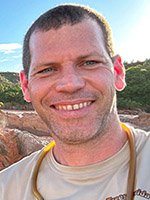 Brian W. Bahder
Brian W. Bahder
University of Florida
Bio: Dr. Bahder is currently an associate professor in the Department of Entomology at the University of Florida. He obtained a bachelor’s degree in entomology from the University of Delaware, master’s degree in entomology from the University of Florida, and a Ph.D. in entomology from Washington State University. During his graduate and post doctoral training, he focused on insect vectors of viral pathogens in grapes where he documented the capacity of mealybugs and scales to transmit grapevine leafroll associated viruses from juice grapes to wine grapes and discovery of the vector of grapevine red blotch virus in wine grapes. Since his appointment at UF, his primary research has focused on discovering and managing the vector of lethal bronzing disease (a fatal phytoplasma infection in palms) in Florida.
Past ESA activity or other volunteer service: Dr. Bahder has been an active member of ESA since 2012. He has consistently attended annual and branch meetings to present his research as well as supported his graduate student by sending them to present their graduate work. Since becoming a member, he has moderated various symposia within the PI-E section as well as reviewed student applications for travel awards. In addition to ESA, he is also an active member in APS (also since 2012) where he participates in national meetings as well as the Caribbean branch of the society, judges student travel award applications, and serves as a senior editor and associate editor to Plant Disease and Phytopathology (respectively), the primary journals to the society.
Candidate statement: I am interested in serving as a representative because now that I am transitioning from an early career to a more established/mid-career scientist, I have gained a better understanding of all aspects of the scientific process (both intellectual and administrative) needed to be successful, and now I can make more meaningful contributions. As a scientist in academia during a very competitive time, publishing is (more than ever) of the utmost importance, and due to my publication record in a very broad range of topics (entomology, plant pathology, eDNA/herpetology, molecular diagnostics, molecular genetics, etc.), I have a much broader experience with the publishing experience than most scientists at my mid-career level. This experience with a wide variety of journals will allow me to bring many fresh and different perspectives to the council at ESA.
 Jasleen Kaur
Jasleen Kaur
University of Florida
Bio: Dr. Jasleen Kaur is a postdoctoral researcher in entomology at the University of Florida. She has published eight peer-reviewed papers (more in progress) and reviewed 12 manuscripts for top journals, providing strong insight into the publishing landscape. Her research spans plant–insect interactions, IPM, and chemical ecology. Since 2020, she has held nine leadership roles across four organizations and served on five university committees, earning college-level recognition for her service as student senator and Graduate Student Council treasurer. As the Southeastern Branch Rep to the Early Career Professionals Committee, Jasleen champions visibility, inclusion, engagement, and professional growth of ECPs within ESA. Her global perspective and commitment to inclusive excellence shape her work and leadership in entomology.
Past ESA activity or other volunteer service: Kaur advances ESA’s mission through service as Southeastern Branch Rep on the Early Career Professionals Committee and ad hoc member of the Education & Outreach Committee, where she refined K-12 learning resources. She has organized three ESA symposia, judged four student competitions, and participated as a debater, four times as an invited speaker, and as a panelist at Annual Meetings as a Ph.D. student. She was competitively selected for the PACT Initiative (2022) and Bayer’s B4U mentoring program (2023). As treasurer/grants chair, she managed $200,000 for two years in student travel awards. She co-led a workshop impacting more than 9,000 students and conducted outreach at 16 events. She is also slated for an interview with Entomology Today.
Candidate statement: I bring global perspective, strong ethics, and a forward-thinking vision to ESA publishing. As Grants Chair, I evaluated interdisciplinary abstracts and managed over $200,000 in awards. I’ve led my own research grant, reviewed for top journals like Ecology, and embraced tools like GitHub to share data transparently. My experience across authorship, peer review, research ethics, and treasury equip me to strengthen ESA’s publishing integrity. I aim to advance fair authorship standards, broaden representation in editorial leadership, and ensure responsible adoption of emerging tools like AI. I’m committed to shaping a more transparent and evolving Publications Council, with a passion for accessible science and cross-disciplinary innovation.
Systematics, Evolution, & Biodiversity (SysEB) Section Elections
SysEB Section Vice President-Elect
ECP Representative to the SysEB Section Governing Council
Student Representative to the SysEB Section Governing Council
SysEB Section Vice President-Elect
- Bruno de Medeiros, Field Museum of Natural History
- Andrew Johnston, Purdue University
- Elizabeth Murray, Washington State University
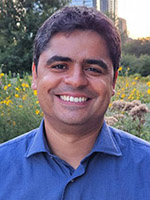 Bruno de Medeiros
Bruno de Medeiros
Field Museum of Natural History
Bio: Bruno is an entomologist broadly interested in systematics, genomics, artificial intelligence, and the evolution of insect-plant interactions. Originally from Brazil, he received bachelor’s and master’s degrees from the University of São Paulo and a Ph.D. from Harvard University in 2018. After a short postdoc at Harvard, he moved to Panama as a postdoctoral fellow at the Smithsonian Tropical Research Institute. In 2022, he started as the Negaunee assistant curator of pollinating insects at the Field Museum.
Past ESA activity or other volunteer service: Bruno joined ESA as a student member in 2016 and has participated in most ESA Annual Meetings since then. He has an extensive record of service to the systematics community as peer reviewer for dozens of manuscripts and as an associate editor for Invertebrate Systematics. He has served as session moderator and judge for student papers at past ESA Annual Meetings and organized symposia at meetings such as the Entomological Collections Network and the International Congress of Entomology. He enjoys serving as a liaison connecting Latin American researchers to their U.S.-based colleagues. One recent example was helping organizers of the upcoming III Encontro de Coleoptera/Coleoptera Meeting to contact potential speakers.
Candidate statement: I have lived in and out of the U.S. for over 14 years as student, postdoc and now curator. These multiple roles give me a good perspective of the challenges facing students and scholars from a variety of backgrounds. I also have a deep appreciation for SysEB’s role in creating a vibrant community, welcoming new people and promoting the sharing of ideas. I firmly believe scientific societies have a strong role to play in today’s world, especially when other institutions may be constrained. This is why I decided to serve at this moment. I am particularly interested in: (1) working with other section officers in further fostering SysEB as a welcoming community and strong advocate for systematics in particular and science at large and (2) creating opportunities for knowledge sharing so insect systematists can take advantage of the ongoing AI revolution.
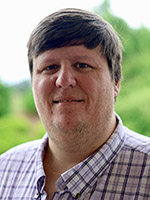 Andrew Johnston
Andrew Johnston
Purdue University
Bio: Dr. Andrew Johnston is an assistant professor in the Purdue University Department of Entomology, where he leads the Insect Diversity and Diagnostics Lab. Andrew is a beetle systematist and earned his Ph.D. in evolutionary biology from Arizona State University. He is a collections-based researcher who combines morphology, molecular systematics, and biodiversity data to understand insect diversity.
Past ESA activity or other volunteer service: Andrew has been an active member of SysEB since 2013. His leadership and volunteer experience with scientific organizations includes serving as vice president for the Entomological Collections Network for four years, serving on the Coleopterists Society Council, and belonging to multiple awards and grants committees for both of those organizations.
Candidate statement: I am very excited at the prospect of serving my colleagues in SysEB! Our field faces new challenges and uncertainty around funding, job markets, and continuity of academic programs. As part of the leadership team, I will communicate our Section's needs and value to stakeholders and continue SysEB's tradition of supporting and involving student members and early career professionals from diverse backgrounds. In particular, I would work to maintain the successful Entomological Collections Management Workshop co-sponsored by SysEB and ECN. I will seek opportunities and additional outlets for SysEB members to interact with each other and share their science broadly within a new funding landscape that presents challenges for conference travel.
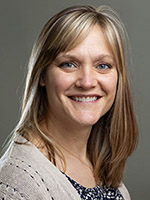 Elizabeth Murray
Elizabeth Murray
Washington State University
Bio: Elizabeth would consider herself a card-carrying entomologist. Since her undergraduate at a liberal arts college in Minnesota, she has completed her education and training in entomology departments across the country—from Kansas State University (M.S.) to UC Riverside (Ph.D.), and then to Cornell (lecturer and postdoc) and the National Museum of Natural History (Peter Buck Postdoctoral Fellow). Her research aims to reconstruct the evolutionary relationships of various groups of bees and wasps to study patterns of evolution and biodiversity. In 2020, Elizabeth joined Washington State University as the Telford Family professor and director of the MT James Entomological Collection, where she collaborates locally to globally. Elizabeth teaches taxonomy and general entomology and advises several students.
Past ESA activity or other volunteer service: Elizabeth has been a member of ESA since 2005 and looks forward to many more years of membership, with continued service to the society. She participated in the Entomology Games as a student and has attended many ECN meetings. She has served as a student competition judge or moderator at the ESA Annual Meeting several times. In 2022, Elizabeth spearheaded organization of the first systematics symposium at a Pacific Branch Meeting in many years, titled “Branching Out: Systematics, Biodiversity, and Evolution.” Elizabeth works to promote women in science and academia and works as her department liaison for WSU ADVANCE, which was an NSF-funded initiative. Additionally, she helped to found the Women of International Society of Hymenopterists committee in 2021. Elizabeth has recently served with the awards committee of SysEB and would like to continue working for the Section.
Candidate statement: Since my time as a graduate student, attending the SysEB business meeting has been a “must” at every ESA I have attended. We have a great Section. I would appreciate the chance to contribute more actively to SysEB in shaping its direction and strategizing for the future. I value data-informed decision-making, while recognizing the importance of incorporating personal perspectives into the process. It is key that people feel welcomed, and I’d work to foster connections in the Section membership. I received a SysEB travel award in 2011 and know how impactful it is for research travel and scientific support. Additionally, the transition to early career professional is a critical time, and I’d explore ESA meeting travel assistance for entomologists not yet in a permanent position. If elected to the board, I would take a collaborative approach in serving our diverse community.
ECP Representative to the SysEB Section Governing Council
Joanie King
New Mexico State University
Bio: Dr. Joanie King is an assistant professor and extension entomology specialist at New Mexico State University. She earned her B.Sc. in biology from the University of Central Florida (2013), her M.Sc. in entomology from the University of Georgia (2017), and her Ph.D. in entomology from Texas A&M University (2022). In 2016, she attended Ant Course. King has published papers on red imported fire ants (Solenopsis invicta) and other entomology research. Currently, she does statewide entomology extension programing and conducts research on harvester ants in southwestern rangelands, as well as other areas (e.g., biodiversity studies). She received the ESA Early Career Professional Outreach and Public Engagement Award in 2021.
Past ESA activity or other volunteer service: King has been an active member of ESA since 2015. As a Ph.D. student, she attended the ESA meetings every year from 2018-2022 and competed in the Entomology Games. In 2020, King served on the Science Communication Awards Committee (2020-2022), participated in the Student Debates, and in 2022 was the lead author on an article for Entomology Today. Upon graduating with her Ph.D. (2022), King was the SWB Entomology Games gamesmaster (2022-2025). King was the SWB program vice chair (2023) and the SWB program chair (2024). She is currently the SWB secretary-elect. King has served as a judge for student presentations. She has also co-organized multiple symposia at various SWB and Annual Meetings.
Candidate statement: I am excited to be nominated for the SysEB Section ECP Representative to the Governing Council. As an assistant professor and extension entomologist at NMSU, I focus on biodiversity, ants, and science outreach. Since 2015, I’ve been involved in ESA through student activities and later (2022-present) in leadership in the Southwestern Branch. I’m passionate about making ECP voices heard in decision-making and promoting inclusion, professional development, and engagement across ESA. If elected, I will represent ECP needs within SysEB and the broader ESA community while supporting a connected and diverse early-career network.
Student Representative to the SysEB Section Governing Council
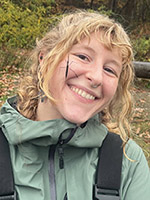 Anna Eichert
Anna Eichert
American Museum of Natural History
Bio: As an undergraduate, Anna fell in love with aquatic insects and conservation after studying the impacts of a megafire and flash flooding on aquatic macroinvertebrate communities in Utah. She is now a Ph.D. candidate at the American Museum of Natural History, where she is working to reconstruct the evolutionary history of stoneflies (Insecta: Plecoptera). With this phylogeny, Anna wants to unveil patterns of stonefly distribution concurrent with global climate oscillations throughout their biogeographical histories. She wants to spend the rest of her career fighting for the conservation of stoneflies and other aquatic insects through research and legislative advocacy.
Past ESA activity or other volunteer service: Anna has been a member of ESA since her undergrad and has presented in the student competitions at every meeting since 2021. She served as president for Brigham Young University’s Entomological Academic Association and led weekly identification events of malaise traps to teach students how to use dichotomous keys. She co-mentored two undergraduate students in the AMNH's research experiences for undergraduates program, and this research is almost published! She is a co-chair of the Status of Insects: RCN Aquatic Insect Decline Working Group, where she is leading projects to survey fly fishers’ observations of aquatic insect abundance over time, create a field guide to the aquatic nymphs of North America for use by the public and other citizen scientists, and review the drivers of aquatic insect decline.
Candidate statement: I truly believe that entomology is for everyone. I love the community and collaborative atmosphere at ESA and will continue to encourage this culture for my entire career. For my time volunteering as the student representative for SysEB, I plan to do my best to bring people together by organizing events for student participation during the ESA Annual Meeting. Facilitating networking and retaining early career scientists from diverse backgrounds strengthens the entire entomological community, and it is more important than ever to do so. I want to spread awareness of funding opportunities that students can obtain from SysEB (and other organizations) to help them accomplish their research, especially in this time of funding uncertainty.
International Branch Elections
International Branch President-Elect
International Branch Treasurer
International Branch Early Career Professional Member-at-Large
International Branch President-Elect
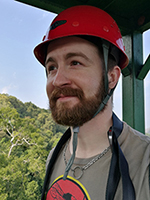 Michael Orr
Michael Orr
State Museum of Natural History Stuttgart
Bio: Michael Orr is an interdisciplinary systematist broadly interested in bees. As the group leader on insect-plant interactions at the Stuttgart Naturkundemuseum in Germany, following positions in the U.S. and China, he works to better our global knowledge of bees. Current projects include bee systematics, bee distribution and conservation with special focus on traits, and the U.S. Beenome initiative. He has given over 50 invited talks in 15 countries and published over 110 articles. His work includes leading roles on papers in journals including National Science Review, Current Biology, Nature Ecology & Evolution, Ecography, Bioscience, and more. A primary future goal of his is modelling overall insect biodiversity.
Past ESA activity or other volunteer service: Michael began his ESA work 12 years ago in the Pacific Branch during his Ph.D. at Utah State. There, he ran the Texting Competition three times, attended board meetings, and received the Student Leadership Award. Michael has attended 14 ESA meetings and organized two ESA member symposia, moderated two ESA symposia, managed two ICE symposia, and four in other venues. He is a volunteer editor for Pan-Pacific Entomologist and Integrative Systematics, and he has reviewed for over 50 journals. Michael is especially interested in bridging the academia-policy gap. He is an Apimondia Solitary Bee Commissioner, a co-lead of the IUCN Asia Solitary Bee Working Group, and a leading taxonomist in the North American IUCN RedListing efforts.
Candidate statement: I see immense and unique potential in the International Branch; strongly mirroring my own experiences and aims, the IB can be viewed as the global arm of ESA. This important position comes with unique challenges. Many are invested in their own national or regional networks, limiting membership and participation. I am ideally positioned to increase engagement, based on my multiple international positions and strong network extending throughout Asia, especially China and India, not to mention Europe. Although opportunities for in-person participation were more limited while I worked in China, I am hopeful that my experience there can enable the co-hosting of future IB meetings in person in China and other countries rather than solely online. In this way, through face-to-face exchanges, we could build a truly international entomology community.
International Branch Treasurer
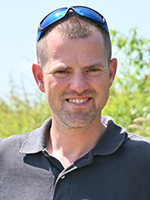 Julien Saguez
Julien Saguez
CÉROM (Centre de recherche sur les grains)
Bio: Dr. Julien Saguez completed his Ph.D. in France in 2007. From 2008 to 2015, he joined Dr. Charles Vincent's laboratory (Agriculture and Agri-Food Canada) as a postdoc and then as a research assistant. He studied tritrophic interactions between leafhoppers, grapevines, and phytoplasmas. Since 2015, he has worked for CÉROM. He develops projects on several field crop pests (e.g., wireworms, moths, corn rootworms) and conducts projects on invasive pests associated with corn and soybean. He is a member of the provincial Pest Monitoring Network, the Great Lake and Maritimes Pest Monitoring Network, and the Canadian Corn Pest Coalition. He introduced the electropenetrography technique in Canada to conduct studies on the feeding behaviour of leafhoppers and aphids. He also uses automated traps to monitor the insect pests. He is coauthor of many papers, guides, and weekly reports.
Past ESA activity or other volunteer service: Saguez is member of three entomological societies: SEQ (Québec), ESC (Canada), and ESA (America, Plant-Insect Ecosystems Section, Eastern Branch and International Branch member). From 2014 to 2017, he was member of the executive committee of the SEQ (president in 2015-2016). In 2015 and 2024, he was involved in the organizing committee of the ESC-SEQ Joint Annual Meeting. In 2016, at the ICE, he co-chaired a symposium and, in 2018 he co-organized a symposium for the ESA, ESC, and ESBC Joint Annual Meeting. He was the representative of the IB on the Governing Board of ESA (2016-2024) and was the liaison for two committees (Common Names, Insect Calendar). He is currently the representative of the IB on the Diversity, Equity, and Inclusion Committee. He has served as judge at several Annual Meetings. He is also a reviewer for several ESA journals.
Candidate statement: As an active member of ESA for the past 10 years, I express my interest in serving as treasurer on the Board of Directors of the International Branch. I have already served the Branch for six years and I am interested in continuing to volunteer. It would be an honor to contribute to the effective governance of the Branch and to work with Branch leaders in advancing our mission, to promote the Branch in order to grow the membership and being more inclusive.
International Branch Early Career Professional Member-at-Large
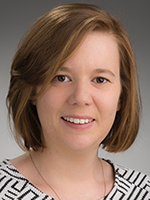 Pauline Deschodt
Pauline Deschodt
University of British Columbia (Vancouver, Canada)
Bio: Pauline is currently a research coordinator at the University of British Columbia (Vancouver, Canada). Originally from France, Pauline completed her Ph.D. in British Columbia studying pathogen interactions in the cabbage looper (Trichoplusia ni). From studying fly parasitoids at the European Biological Control Laboratory in France to exploring the role of the gut microbiome in insect susceptibility to baculoviruses in Canada, Pauline has mainly focused on plant-insect-parasite tritrophic interactions and sustainable microbial control strategies. Pauline is currently working on pollinator diversity in the Western Canadian North and will head for her first field season in the Yukon Territory in June 2025. Besides her research, Pauline enjoys hiking in the mountains and sharing her interests for insects and science with the younger generation.
Past ESA activity or other volunteer service: Pauline has been an active member of the ESA International Branch since 2023. Throughout her career, Pauline remained involved in various Canadian and international entomological societies. From 2016 to 2018, and again from 2019 to 2021, she served as student representative for the Professional Pest Management Association of British Columbia. From 2018 to 2020, Pauline was elected student representative for the microbial division of the Society for Invertebrate Pathology. During the COVID-19 pandemic, Pauline co-created and hosted the Canadian Entomology, Ecology and Evolution virtual seminar series with Dr. Paul Abram, providing a platform for early career scientists and other researchers to connect and share their work during lockdown.
Candidate statement: For me, being an active member of the Entomological Society of America is being part of a community. After I graduated from my Ph.D., I’ve seen how valuable networks are shaping opportunities, and I want to help others navigate this stage. I am applying to renew my position because I believe that I can contribute even more now, with a clearer understanding of how to support early career members. I think it is particularly important to remain connected with my fellow entomologists and support other early career scientists. In my current position, I mentor graduate students and postdocs and oversee hiring, giving me insight into the needs of applicants. As an immigrant in Canada, I understand better the challenge faced by international graduate students and early career scientists. I would be honored to continue supporting the diverse voices within the International Branch.
Pacific Branch Elections
Pacific Branch Representative to the Governing Board
- David Crowder, Washington State University
- Mark G. Wright, University of Hawai'i at Manoa
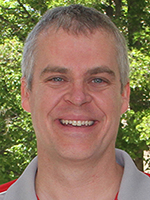 David Crowder
David Crowder
Washington State University
Bio: David Crowder is a professor of entomology and director of digital agriculture systems at Washington State University. He received his B.S. and M.S. in environmental sciences from the University of Illinois and his Ph.D. in entomology from the University of Arizona. He has supervised over 20 grad students and 15 postdocs, and his current lab has six graduate students and five postdoc scholars. As the director of digital agriculture systems, Crowder leads and online decision aid system used by over 90% of the Washington tree fruit and potato industry, saving growers over $20 million per year. He has been a member of ESA since 2003 and is a 2017 recipient of the Pacific Branch Plant-Insect Ecosystems Award. He was a member of the team that won the 2025 Frontiers Plant Prize for the most impactful international paper on sustainable agriculture.
Past ESA activity or other volunteer service: David Crowder has been an ESA member since 2003 and has organized over 15 symposia at Annual and Pacific Branch meetings, and his lab has given over 50 talks. He served as the program chair of the Pacific Branch Meeting for three years, has reviewed over 75 manuscripts for ESA journals, and has served as a judge at Annual and Pacific Branch Meetings for over 10 years. He is currently a member of the National Academy of Sciences Committee on the Status of Insects in North America, where he and others will provide an overview of the long-term trajectory of insect populations. He is also organizing a Program Symposium at the 2025 ESA Annual Meeting.
Candidate statement: I am interested in serving as the Pacific Branch representative to the Governing Board so I can be an advocate for entomology. I had my first opportunity to attend an ESA meeting in 2003 as an undergraduate, and it changed the trajectory of my life. I had not intended to pursue a career in entomology, but the people I met at that meeting inspired my current career. As I am now a full professor, I wish to use my expertise to guide younger faculty, students, and postdocs to advance their own careers. If I am fortunate to be elected to the Governing Board, I will serve as a conduit between members of the Pacific Branch and the Annual Meeting, advocating for our Branch and mentoring younger Society members.
Mark G. Wright 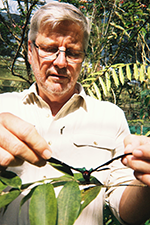
University of Hawai'i at Manoa
Bio: Mark earned his Ph.D. at the University of Natal, Pietermaritzburg (now University of KwaZulu-Natal), researching insect diversity in the Cape Floristic Region. He completed postdoctoral work at Cornell University on augmentative biocontrol of European corn borer. Since 2001, he has been a professor and extension specialist at the University of Hawai‘i. He has received numerous grants from federal, state, and private sources and leads an active lab with graduate students and postdoctoral researchers. He has published 136 peer-reviewed papers and book chapters. His research includes tropical fruit pest management, classical biocontrol, and using honey bees to reduce human-elephant conflict.
Past ESA activity or other volunteer service:
- ESA member since 2001.
- Elected to Governing Board of the Entomological Society of America (2022-2025).
- Pacific Branch, Entomological Society of America: president-elect (2019-2020), president (2020-2021), past president (2021-2022).
- Plant-Insect Ecosystems Section, Entomological Society of America: vice-president, (2016-2017), president (2017-2018), past president (2018-2019).
- Member of Editorial Board, Entomological Society of America Plant-Insect Ecosystems Section representative, Environmental Entomology, 2013-2014 (chair of editorial board, 2014).
Candidate statement: I am interested in continuing to serve as the Pacific Branch representative to the ESA Governing Board for a second term. I believe I have grown into the role during my first term and have more to contribute. I will continue supporting innovative ESA approaches to the Society’s key issues and help strengthen the services it offers members—fiscally, environmentally, and through new publication models. I’m committed to applying insect science for societal and environmental benefit and to addressing the challenges faced by the scientific community. I aim to ensure ESA's diverse membership is supported and empowered to advance their work.
Southeastern Branch Elections
Southeastern Branch Representative to the Governing Board
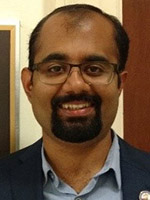 Cheri Abraham
Cheri Abraham
Syngenta Crop Protection
Bio: Originally from India, Dr. Abraham came to the U.S. for an M.S. in entomology at Mississippi State University. Later, during his Ph.D. in entomology at University of Georgia, he won ESA’s Larry Larson Graduate Student Award for Leadership in Applied Entomology. After graduation, recognizing the opportunity to impact the broader field of agriculture, he accepted a field crop entomologist role in a startup citrus company. There, he developed IPM and production programs for both the orchard and nursery divisions and eventually also managed other facets of the company as the director of operations. His next assignment as the research leader was for a citrus operation with 12,000 grove acres across Florida. Currently an R&D entomologist at Syngenta Crop Protection in Vero Beach, Florida, he supports data generation efforts for active ingredients at various stages in their pipeline.
Past ESA activity or other volunteer service: Abraham, a 19-year member of the Entomological Society of America, started serving the Society as vice-chair and chair of the Student Affairs Committee at the SEB and ESA during his graduate student days. He was able to implement new initiatives to support student participation and experiences both at the Branch and national level. A Science Policy Fellow from the class of 2017, Abraham has served several volunteer positions including ESA Program Committee, ESA Science Policy Committee, PIE Event Oversight & Nominations Committees, judging committees for various ESA Awards, and most recently, program co-chair for the 2025 SEB meeting. His current tenure on the ESA Leadership Development Committee and ESA Entomology Games Committee (EGC) ends November 2025. As chair of the 2024 EGC, he spearheaded the first ever Entomology Games texting competition at ESA.
Candidate statement: I am truly honored and excited to be nominated to represent the Entomological Society of America’s Southeastern Branch on the Governing Board. ESA serves as a powerful, unifying force for our discipline, and this opportunity is both a privilege and a meaningful way to give back to the Society that has significantly shaped my professional growth, provided invaluable resources, and connected me with an inspiring community of peers. I am excited to contribute to the activities of the Governing Board, while getting an intimate view of the workings of our Society. I am passionate about supporting our students and early career professionals, who are the future of our discipline, while acknowledging the seasoned professionals that have paved and walked this path before us. I am also motivated to work with fellow members to empower and advance our Society and the future of entomology.

